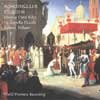Rosenmüller Requiem; Motets
Not Rosenmüller’s finest music, but here in enterprising and sensitive performances
View record and artist detailsRecord and Artist Details
Composer or Director: Johann Rosenmüller
Genre:
Vocal
Label: Vivarte
Magazine Review Date: 6/2003
Media Format: CD or Download
Media Runtime: 91
Mastering:
Stereo
DDD
Catalogue Number: S2K89470

Tracks:
| Composition | Artist Credit |
|---|---|
| Requiem (Missa pro Defunctis) |
Johann Rosenmüller, Composer
(La) Capella Ducale Cologne Musica Fiata Johann Rosenmüller, Composer Roland Wilson, Cornett |
| Ad Dominum cum tribularer clamavi |
Johann Rosenmüller, Composer
(La) Capella Ducale Cologne Musica Fiata Johann Rosenmüller, Composer Roland Wilson, Cornett |
| Miserere |
Johann Rosenmüller, Composer
(La) Capella Ducale Cologne Musica Fiata Johann Rosenmüller, Composer Roland Wilson, Cornett |
| Domine ne in furore tuo |
Johann Rosenmüller, Composer
(La) Capella Ducale Cologne Musica Fiata Johann Rosenmüller, Composer Roland Wilson, Cornett |
| Sonate da Camera, Movement: E minor |
Johann Rosenmüller, Composer
Cologne Musica Fiata Johann Rosenmüller, Composer Roland Wilson, Cornett |
Author: Jonathan Freeman-Attwood
Even by 17th-century standards, Rosenmüller’s vocal output is substantial and borders regularly on the profoundly impressive. That much we can derive from a fine set of Vespers which Cantus Cölln recorded in 1996 (Harmonia Mundi, 2/97) in which a cycle of Marian devotions uncovered many Venetian-inspired peaks of spectacular scoring and imaginative text-setting. Working within a similar liturgical framework, Roland Wilson has constructed a speculative ‘world-première’ Rosenmüller Requiem from a single source, the Bokemeyer Collection in Berlin. Interchanging Mass, motet and a single instrumental number with regular plainchant, the desired unifying effect is achieved without making great claims in the name of authenticity. The pieces are (understandably in the circumstances) rather less flamboyant than Rosenmüller’s Vespers music and Wilson, with his expert Cologne Musica Fiata and La Capella Ducale, illuminate the clear textual imagery with a finely-wrought and understated lyricism. Its success can be gauged in the solo sections of the substantial ‘Dies Irae’ where references to the cross and hoped-for redemption (‘redemisti crucem’ and, later, ‘culpa rubet’) bring out a deeply considered and measured response from Wilson’s forces. Likewise, the affecting conclusion, whose ‘Lachrimosa’ is both incisively projected and gently caressed – essential attributes given the highly contrasted nature of this music. Attention to detail manifests itself in the short Sinfonia Ottava for strings.
Some will want to ‘cut to the chase’ and bask in the sureness of Rosenmüller’s famed textural flair – a full-blooded homophony which is always immaculately voiced – but there really isn’t that much of it here. The music largely consists of reflective and imploring dialogues, such as in the measured expanses of the Miserere, in which solos and instrumental commentaries adorn the contemplative text through doleful exchanges, occasionally merging for a united declamation. In all truth, it is hard to extract many of these pieces from their liturgical context and purpose and feel inspired on the merits of the music alone (Psalm 6, ‘Domine ne in furore’, is arguably in a league of its own). No suchproblems exist for those who know the above-mentioned Vespers recording for whom Rosenmüller’s credentials as the Teutonic heir to Monteverdi are heard in works of altogether far greater interest. I admire much aboutWilson’s approach here, especially his unforced characterisation of the ‘Dies Irae’ and the Psalm (although Harry van der Kamp’s voice can seem too languorous for the mesmerising passagi), the concentrated poignancy of the Agnus Dei and excellent chant singing throughout. The incessant E minor is a touch hard on the ear, especially as the music falls short of expectations. Two short discs for hardened aficionados.
Some will want to ‘cut to the chase’ and bask in the sureness of Rosenmüller’s famed textural flair – a full-blooded homophony which is always immaculately voiced – but there really isn’t that much of it here. The music largely consists of reflective and imploring dialogues, such as in the measured expanses of the Miserere, in which solos and instrumental commentaries adorn the contemplative text through doleful exchanges, occasionally merging for a united declamation. In all truth, it is hard to extract many of these pieces from their liturgical context and purpose and feel inspired on the merits of the music alone (Psalm 6, ‘Domine ne in furore’, is arguably in a league of its own). No suchproblems exist for those who know the above-mentioned Vespers recording for whom Rosenmüller’s credentials as the Teutonic heir to Monteverdi are heard in works of altogether far greater interest. I admire much aboutWilson’s approach here, especially his unforced characterisation of the ‘Dies Irae’ and the Psalm (although Harry van der Kamp’s voice can seem too languorous for the mesmerising passagi), the concentrated poignancy of the Agnus Dei and excellent chant singing throughout. The incessant E minor is a touch hard on the ear, especially as the music falls short of expectations. Two short discs for hardened aficionados.
Discover the world's largest classical music catalogue with Presto Music.

Gramophone Digital Club
- Digital Edition
- Digital Archive
- Reviews Database
- Full website access
From £8.75 / month
Subscribe
Gramophone Full Club
- Print Edition
- Digital Edition
- Digital Archive
- Reviews Database
- Full website access
From £11.00 / month
Subscribe
If you are a library, university or other organisation that would be interested in an institutional subscription to Gramophone please click here for further information.




